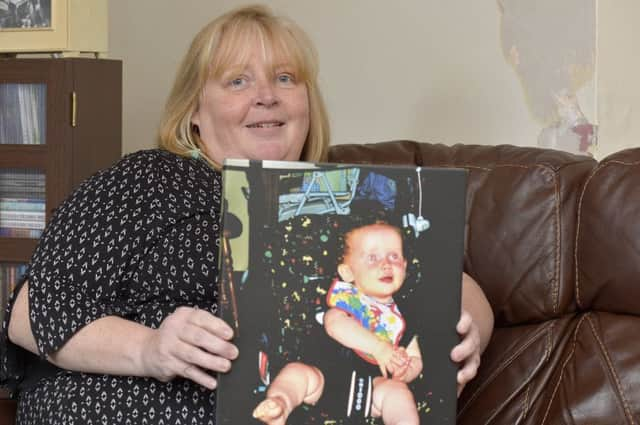Accessing support is '˜vital' for families experiencing rare conditions


In the north this equates to over 100,000 people, approximately the same population size as Derry city.
Local woman Anita McDowell’s first experience with a rare condition was when her son, Marc, was diagnosed with Tay-Sachs Disease in 1998.
Advertisement
Hide AdAdvertisement
Hide AdHowever, this was not to be her only experience with a rare disease.
“Marc was born on September 18, 1997 and seemed to be the beautiful, healthy baby that all mothers dream of. However, by the time Marc reached seven months old I had developed this overwhelming sense that I was going to lose our baby boy.”
Marc was the second of three boys in the McDowell family and was a contented and happy baby.
However, Anita began to grow concerned that Marc was slow to develop certain skills and his reactions often seemed jumpy and erratic, it also became apparent that Marc could not hear.
Advertisement
Hide AdAdvertisement
Hide AdIn August 1998, at only 11 months old, Marc was diagnosed with Tay-Sachs Disease, a progressive and ultimately fatal neurodegenerative disorder.
It was at this point that Anita reached out to Sandra Campbell, now a long serving volunteer with the Northern Ireland Rare Disease Partnership (NIRDP).
Anita commented: “Sandra was a fantastic source of support for me and was able to sign post me to other families within Northern Ireland who were affected by similar conditions. I found her support and signposting so vital at this point in Marc’s illness as it was all very overwhelming and difficult to deal with.”
Sadly little Marc died at the age of 18 months in March, 1999, and his death left his family and local community, completely inconsolable.
Advertisement
Hide AdAdvertisement
Hide AdThe following years were not easy for the McDowell family and in 2011 Anita’s eldest son collapsed and suffered a major seizure while on a family holiday. Blood tests came back normal and it was thought he was suffering from stress.
His condition did not improve and Anita began to search for her own answers. She came into contact with the charity STARS (Syncope Trust and Reflex anoxic Seizures). and Anita and her son were referred to a professor.
He discovered that Anita’s son was suffering from Postural Orthostatic Tachycardia Syndrome (POTS), where an abnormal increase in heart rate occurs after sitting up or standing, and vaso-vagal syncope, which causes causes the heart rate and blood pressure to drop suddenly.
The McDowells returned home seeking an official diagnosis and treatment but continually met dead ends. Being unable to get an official diagnosis meant that treatment for the condition was also unavailable.
Advertisement
Hide AdAdvertisement
Hide AdEventually Anita and her family felt that they had no option but to go privately for trials with cardiologists, rheumatologists and geneticists.
Anita was also tested and it was revealed she had a number of rare conditions including POTS, Ehlers-Danlos syndrome (EDS) and Chiari malformation.
Anita comments “My diagnosis was not something that we were prepared for and I was unsure of where to turn to next.
“Once again, I found myself looking towards the help, advice and support of the NIRDP.
Advertisement
Hide AdAdvertisement
Hide Ad“It is hard to imagine that three people in the same family could experience such life changing and life limiting conditions, but what I find hardest to accept is that there are other families in NI, also affected by rare conditions who struggle, as we did to receive a diagnosis.
She added: “Accessing help or support can be so vital to families experiencing rare conditions and, luckily, we found the support that we needed through STARS and the NI Rare Disease Partnership. Having access to these networks has been so important to us as a family, and to me personally, as it has offered me the chance to meet people affected by similar circumstances and has offered me a personal network of support and friendship.”
The next meeting of the NIRDP Foyle and NW forum takes place on May 19, 11am-1pm in the City Hotel, Derry.
For further information log onto www.nirdp.org.uk